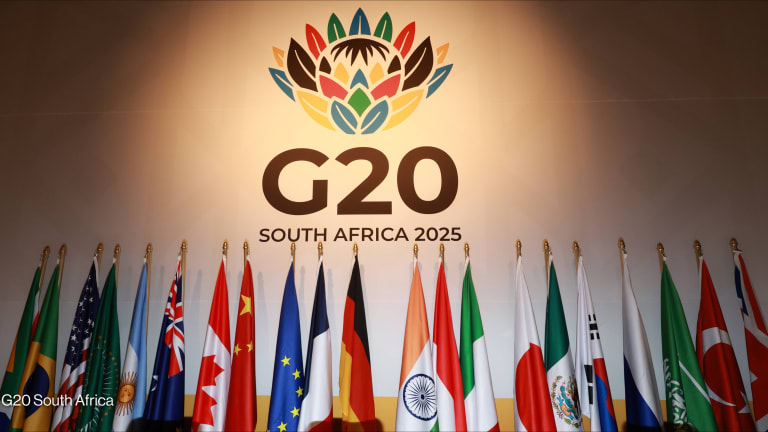
WASHINGTON — There is a dearth of leadership in the global response to the COVID-19 pandemic and a need to step up investment, debt relief, and long-term planning to see the poorest countries through the crisis, Gayle Smith, president and CEO at the ONE Campaign, told Devex.
“I have never seen a crisis — certainly of this proportion or of even half this dimension — where the international community had done so little to rally or join together to respond to it,” Smith said. “There's a deficit of global leadership.”
“Every moment that is spent having some kind of political argument is a moment that is not spent on defeating the virus.”
— Gayle Smith, president and CEO, ONE CampaignThe United Nations Security Council has been quiet in response, when normally it would play a role. And what Smith called “one of the most alarming things about this crisis” is that there has not yet been a group of global leaders who have joined together to jump-start global cooperation to help with the COVID-19 pandemic.
COVID-19 — a timeline of the coronavirus outbreak
Follow the latest developments on the new coronavirus that causes COVID-19.
In addition to a lack of cooperation, there has been significant political conflict between countries, which is a huge problem costing lives and money and means that the world will be slower to defeat the pandemic, she said.
“Regardless of the merits of any of these arguments, viruses really love it when countries fight with each other because it gives them an opening,” she said. “Every moment that is spent having some kind of political argument is a moment that is not spent on defeating the virus and trying to shore up countries’ economies and communities against the economic impact.”
But despite the deficits in global leadership, discussions about strong economic measures in support of Africa, including those around debt relief, are gaining traction, she said.
The World Bank said last week that growth in sub-Saharan Africa had been severely impacted by the coronavirus outbreak and predicted that the region could go into a recession for the first time in 25 years, meaning that “hard fought progress is going to get a real kick in the teeth, and we’re already seeing the economic impact,” Smith said.
Debt relief is a critical piece of the economic response, because without it, other aid or economic stimulus efforts may well just go to debt repayment and not solve resource challenges. While there are multiple proposals being discussed, including around the G-20, World Bank, and International Monetary Fund meetings this week, the form of debt relief might well change over time, she said.
There have been concerns that China won’t participate in a debt relief program, and debt response needs to be universal, according to several experts. But Smith said that “it’s worth considering whether [China] might want to play.”
China is interested in developing partners across the world, as evidenced by its Belt and Road Initiative, and has an economic interest in ensuring those economies don’t decline sharply. In addition, the country might participate in a debt relief package if everyone else is doing so, she said.
“That's speculation on my part, and it's certainly not in the bag. But I would hope their calculus is that they need to join the rest of the world, if the rest of the world goes along,” Smith said.
The ONE Campaign is hopeful that critical discussions about debt relief this week will push progress on the issue, but “whether they go far enough, fast enough, we’ll see,” she said.
The U.S. Agency for International Development, which Smith led as administrator during the presidency of Barack Obama, has the tools and experience to play a critical role in the global response and brings an important longer-term perspective to some of the discussions, she said.
“USAID's got an extraordinary capacity in terms of complex crisis response to be creative, to be thoughtful, to build on experience, to collaborate with others. And one of the things I hope we will see is a USAID empowered to do that,” Smith said.
During the Ebola crisis in West Africa, USAID was able to build some health infrastructure even as it was responding, identifying and working to fill key gaps that were exposed. The development community, African governments, and others have invested heavily not only in combating diseases but also in building health systems, so part of the recovery to COVID-19 must be rebuilding the damage done to those systems, she said.
According to Smith, the recovery and next phase of the efforts to prevent future pandemics already have a guide: the Global Health Security Agenda. The GHSA is a group of countries, international organizations, NGOs, and private companies that joined together to help keep the world safe from infectious disease threats, and it has performed expert evaluations in more than 100 countries to identify gaps in health infrastructure, be they in laboratory capacity or surveillance.
Money, expertise, and development cooperation are needed to help fill those gaps, and while costly, this will be a lot cheaper than the response to the current or any future crisis, she said.
“This notion of global health security and building the architecture that, frankly, we should have had and still don't have, I think, is something there's much greater openness to now than there certainly was a year ago,” Smith said.
While in the past, momentum on these issues may have waned as a crisis ended, Smith said she thinks this one is different.
“I suspect that this is big enough. It will be the health implications, but quite frankly, I think for a lot of political leaders, it's going to be the economic implications [that make them] say, ‘Oh my, we better get quick off the dime to put in place something so that doesn't happen again,’” Smith said.
Visit our dedicated COVID-19 page for news, job opportunities, and funding insights.









